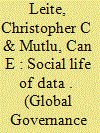|
|
|
Sort Order |
|
|
|
Items / Page
|
|
|
|
|
|
|
| Srl | Item |
| 1 |
ID:
141446


|
|
|
|
|
| Summary/Abstract |
There is a profound disconnect between the practice and scholarly study of security in Europe. The 2010 Internal Security Strategy added disasters such as forest fires, earthquakes, and floods to the list of European Union (EU) internal security concerns, expanding on the more traditional anxieties over militaries, border protection, and the effects of poverty. This article explores how evolving practices of disaster response, a policy area once separate from EU security discourse, have become part of the EU's wider security provision and with what implications. Based on interviews conducted at the Directorate-General (DG) for Humanitarian Aid and Civil Protection (ECHO), it provides a detailed study of three EU disaster response practices – monitoring, training, and information co-ordinating – and their circulation to the wider field of EU internal security provision. It uses this case to outline that new understandings of what it means to “voluntarily co-operate” in European security projects have been radically under-theorized.
|
|
|
|
|
|
|
|
|
|
|
|
|
|
|
|
| 2 |
ID:
151672


|
|
|
|
|
| Summary/Abstract |
The articles in this special section argue that, by looking at quantification as a technical and political technique of power, we can effectively engage with newly established types of transnational power and better understand how numbers can enable reconfigurations and hence reorderings of power relations. The section looks at how numbers, in the form of risk assessments, measuring for results, and governance indicators, have a crucial impact in current transnational politics, which in turn influences resource allocation and recognition, discourses on undesirable individuals, possibilities for political leverage, and potential ownership.
|
|
|
|
|
|
|
|
|
|
|
|
|
|
|
|
| 3 |
ID:
151676


|
|
|
|
|
| Summary/Abstract |
Data presented in European Union documents have a social life of their own; they are collected, analyzed, disseminated, used, and reused. Along the way, data interact with different external elements—economic, social, and political actors, positions, and preferences—transforming their potential for different contexts and meanings. The Directorates-General are significant data actors, involved in both data-gathering and fact dissemination stages of data's social life and controlling the flows of data through the EU. This article focuses on the social life of two sets of data, tracing the evolution of these datasets into political discourses about disaster response and migration, and arguing that data never speak for themselves but rather evolve into facts through networks, which shape official policy discourses.
|
|
|
|
|
|
|
|
|
|
|
|
|
|
|
|
|
|
|
|
|